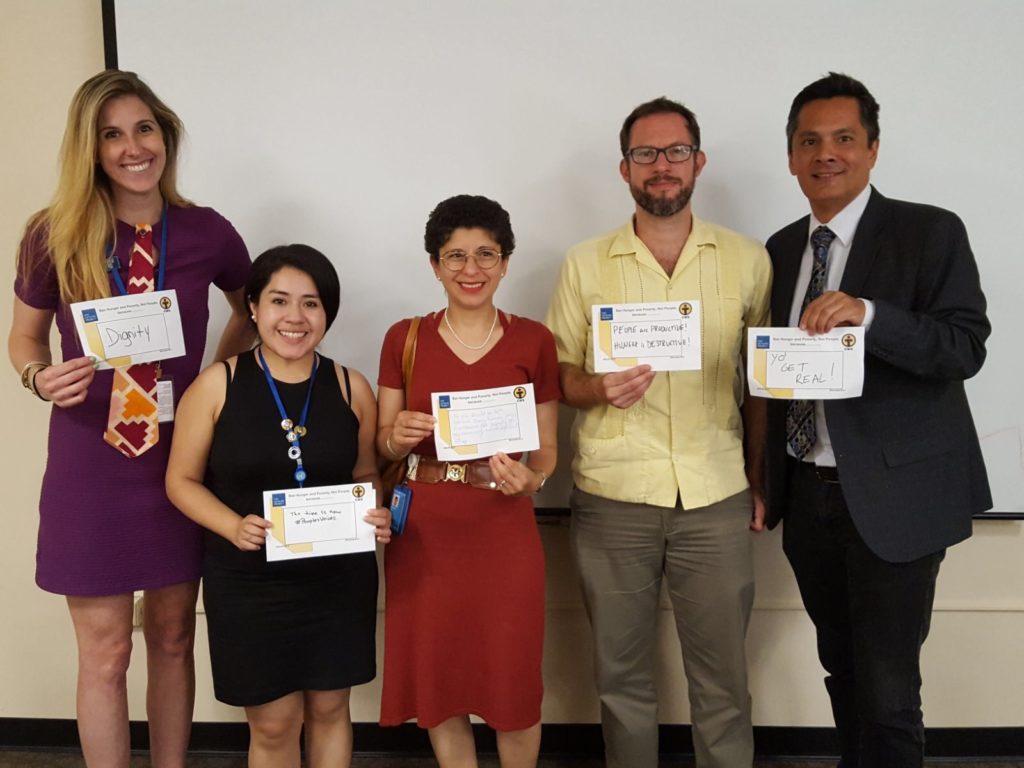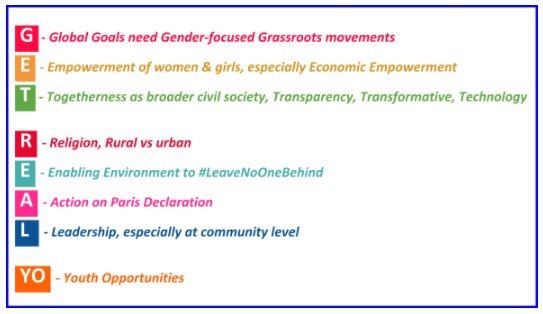This blog was originally published by The Hunger Project.
Get real, yo. This was the concluding summary of an important event about migration and refugees held during the United Nation’s 2017 High Level Political Forum. Executive Vice President of Church World Service, Maurice A. Bloem, determined in his closing remarks that the global community needs to face the reality of the migration crisis and get serious about meeting human rights for each human.
Church World Service, a global and first responder to the migration crisis, collaborated with the gender-focused global development organization, The Hunger Project, to host an event that honed in on inexcusable gaps in supporting migrants and building resilience in a time of the most migrants in the history of the human population. Senior Policy Analyst and UN Representative, Mary Kate Costello, prodded the panelists to address the contentious issues of culture, xenophobia and donor restrictions in times of protracted crisis.
Andrew Fuys, Director of Program Innovation and Evaluation at Church World Service, addressed that while many funders place limitations on contributions to humanitarian efforts and displaced persons, implementation of response-efforts can still prioritize livelihood opportunities toward migrants’ self-reliance and mitigate cases of extortion and other threats against refugee women who seek to meet basic needs.
Throughout HLPF, many UN Member States report out on their voluntary national reviews about progress toward the SDGs and other recent resolutions. Challenges, successes and gaps reflect impact for and by their resident populations, and often without clear mention of present migrant populations or refugees within their countries. So, who is accountable for ensuring the human rights – and therefore dignity – of migrants and refugees? How can host governments, responding multilateral agencies and civil society organizations uphold progress toward SDGs for migrants and refugees?
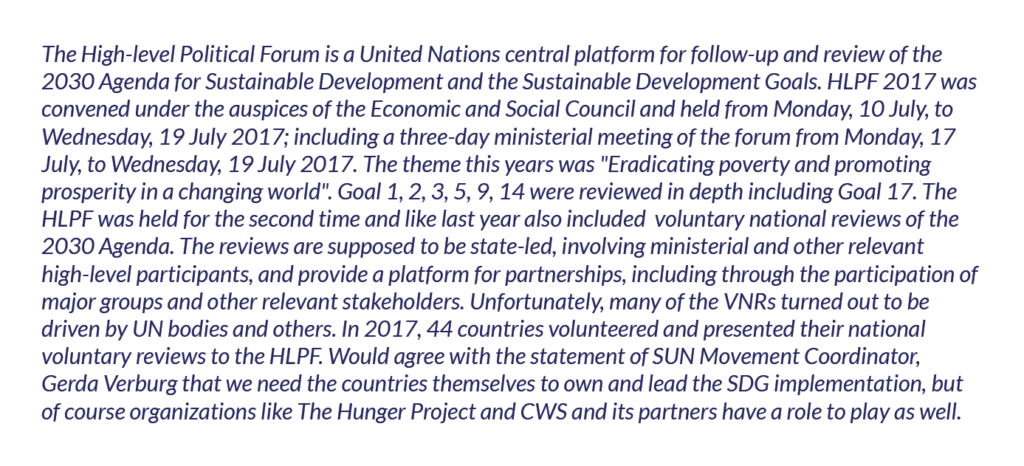 Migrants and refugees do not have voting rights and in many cases cannot obtain decent or any employment due to policies and lack of employability in their new context. Most live in their new surroundings without recognized voice. In the short term, they suffer immeasurably and irreversibly. And in the long term this means slowing progress writ large.
Migrants and refugees do not have voting rights and in many cases cannot obtain decent or any employment due to policies and lack of employability in their new context. Most live in their new surroundings without recognized voice. In the short term, they suffer immeasurably and irreversibly. And in the long term this means slowing progress writ large.
Migrants and refugees are not a homogenous group. They are made up persons from various religions, genders, sexual orientations, income levels, education levels, and so on. Thus, their needs are just as varied – especially in the areas of education, skills building and health access. Of utmost importance, and priority for UNFPA and Church World Service in working with migrants, is community leadership, cultural sensitivity and creating livelihood choices to ensure individuals’ autonomy and dignity.
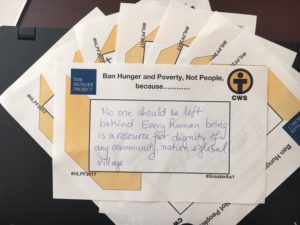 The latter can be especially challenging given immigration work permit processes, job availability, demand versus supply, and any migrants’ personal funds for investment lost during their displacement. Thus, responding organization and agencies are crucial in making market expansion assessments to determine possible and dignified income options for migrants.
The latter can be especially challenging given immigration work permit processes, job availability, demand versus supply, and any migrants’ personal funds for investment lost during their displacement. Thus, responding organization and agencies are crucial in making market expansion assessments to determine possible and dignified income options for migrants.
UNFPA, the United Nation’s Population Fund, is paying particular attention to the politicized dynamics of providing sexual and reproductive health rights, as well as other personal needs such as head scarves for women to feel comfortable leaving their camp to obtain basic goods. These human rights based health approached and faith-revering responses are helping provide migrants with both comfortable and life saving transitions to life in a camp or new host country.
Panelist and UNFPA’s Senir Advisor on Culture, Dr. Azza Karam, explained that both secular and faith-based responders must increase their collaboration and break down any preconceived notions of their initiatives simply because of a specific religious affiliation or none at all. She noted that organizations such as, Church World Service, World Vision and Islamic Relief prioritize people writ large, not only people of a certain religion.
In response, Mary Kate reminded event attendees that the youth attendees of the 2016 CSW Youth Forum included in their Youth Declaration the need for interreligious and intercultural dialogues, especially for young women’s economic empowerment. If youth see this is as the way forward for a peaceful, productive and sustainable world, it will behoove us to heed this call to action and leverage their leadership.
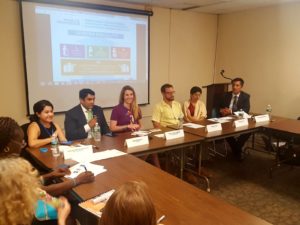 As it concerns displaced and other migrant youth, 50 percent are women and girl, yet according to UN Women’s Ravi Karkara, only four percent of global resources are allocated specifically for their empowerment. UN Women’s Gender Framework, LEAPs, encapsulates programmatic needs for young women’s empowerment, and is easily applied to any initiative. Ravi stated that it is especially crucial for such to be monitored and evaluated using data that is disaggregated by both age and gender.
As it concerns displaced and other migrant youth, 50 percent are women and girl, yet according to UN Women’s Ravi Karkara, only four percent of global resources are allocated specifically for their empowerment. UN Women’s Gender Framework, LEAPs, encapsulates programmatic needs for young women’s empowerment, and is easily applied to any initiative. Ravi stated that it is especially crucial for such to be monitored and evaluated using data that is disaggregated by both age and gender.
Internal migration also disproportionately affects women and girls. Rosie del Pilar Garavito, HLPF Youth Delegate for the Mission of Peru to the UN and Founder of The Millennials Movement, spoke about the unique prevalence of internal displacement and migration for Peruvians due to climate change and seeking economic opportunity. In coping as the third most affected nation by climate change, a diverse Peruvian population faces exacerbating xenophobia as cultural groups’ home areas change and attempt to integrate with others. However, she noted that Peru is astutely looking beyond the Global Goals’ deadline of 2030 and aiming toward a plan for development and climate change adaptation through 2050. More from Peru’s VNR can be read here.
In thinking about migration response, improving local capacities and leveraging indigenous technologies and innovations can be efficient efforts for those at-risk of becoming displaced. Leveraging local resources and capacities is more often than not more time and money efficient in building up resilience of persons on the verge of displacement.
In summary, we learned that we need to #GetRealYO (see text box).
As one of the audience participants said: No one should be left behind. Every human being is a resource for dignity of any community, nation & global village. #GETREALYO because we are #GREATERAS1.

